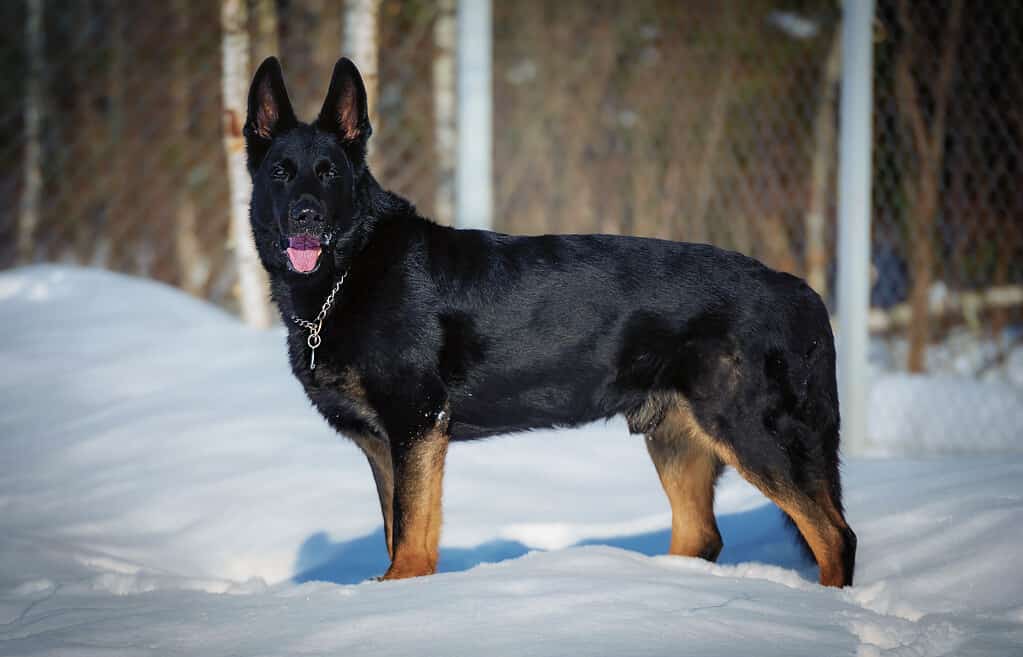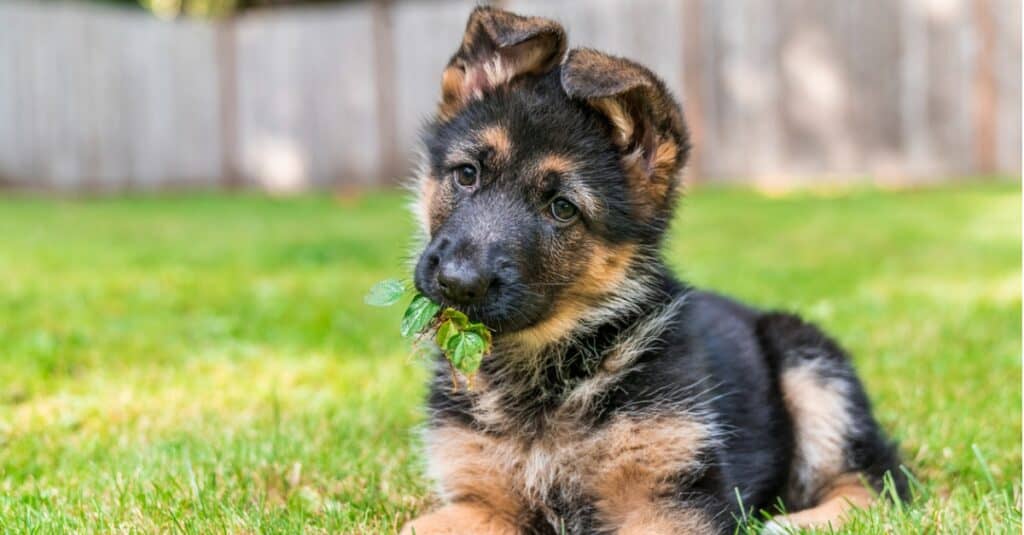German Shepherds are one of the most popular dog breeds in America today. People like them because they are loyal and smart, and they are protective of their owners. Their roots trace back to 19th-century Germany where they were bred as herding dogs. The traits they possess include a strong sense of smell, strength, speed, and intelligence, and they are easy to train. As a result, they became popular in such fields as bomb-sniffing, search and rescue, military, and law enforcement. In 1889 Max Emil Friedrich von Stephanitz, a German cavalry officer, worked to refine the breed to accentuate the traits he most admired to create the ultimate herder, a German sheepdog. Read on to find out more about German Shepherds as hunting dogs: pros and limitations to know.
Size and Life Expectancy

An adult male
German Shepherd
looks majestic, powerful, and alert.
©Sansargo/ via Getty Images
The breed ranges in size from 22-26 inches tall and weigh between 50-90 pounds. Their average lifespan is between 9-13 years. To improve their health and lifespan make sure to select a reputable breeder, feed them quality food, provide exercise, watch their weight, and visit the vet regularly.
Caring for German Shepherds
These active dogs need regular exercise for both mental and physical health. Minimally 2 hours a day of exercise is recommended on and off leash in safe areas. Begin training and socialization when they are young. Their double coat causes them to shed a lot so regular brushing is important. They also go through a molting period one or two times a year which increases the amount of hair they shed. Bathe them every couple of months.
German Shepherd Temperament
Strong and highly intelligent, German Shepherds can be challenging to train. Their temperament ranges from patient and calm to high-spirited and playful. They are not naturally aggressive but can be protective and aloof with people they do not know. These self-assured dogs excel in canine sports and obedience training. Confidence, consistency, and patience by the owner are needed during training. In addition, it can take up to two years for them to mature.
But Can They Hunt?
It is not in their nature to hunt. They were bred to herd but can be trained to hunt in certain categories. German Shepherds possess many of the qualities that pertain to hunting dogs such as strong noses and a tracking ability. Not only are they herders, but they are also known as working dogs. This breed is eager to please, they have a high endurance and a great work ethic.
German Shepherds can spot objects from long distances and bring them back to their owners. They are best used to retrieve and track small animals such as fowl, vermin, and rabbits. Additionally, they would excel at locating deer trails and tracking wounded deer as they are fast, and can run long distances. However, their power and size could create problems as they may scare prey.
Traits of Good Hunting Dogs
A good hunting dog will know exactly what to do, when to pursue and when to kill prey, and to wait for commands from its owner. They will gently retrieve fowl without shaking them. Good hunting dogs are obedient, and loyal to their owners, traits that German Shepherds possess. A good hunting dog is fearless, even-tempered, and predictable. They must be up to the task and have athletic ability. Hunting dogs develop a bond with their owners. A properly trained German Shepherd can master all of these things with patience. German Shepherds as hunting dogs: 11 pros and limitations to know include:
Pros
- Excel at tracking
- Easily trained
- Obedient
- Alert
- Confident
Cons
- Mouthy
- They overheat
- Bred to herd
- Prone to hip dysplasia
- Not naturally good retrievers
- Barkers
Training a German Shepherd to Hunt

Begin training when they are puppies starting with obedience training.
©iStock.com/Barb
Begin training when they are puppies starting with obedience training. This allows them to gain the confidence they need to carry on the tasks required for hunting. Socialization is important as it creates a bond making training and following commands easier. It takes time to train, but German Shepherds are naturally obedient and have the potential to be good hunting companions.
The best type of hunting for them is scent-tracking. They can learn to retrieve fowl, but they need to be taught not to shake or damage them. A dog from the working line is the best option to train as they will have fewer behavioral and temperament issues. It will take a lot of work to train them to stay nearby and prevent them from scaring animals.
Running your dog through open fields allows them to explore and get comfortable with wide-open areas they can confidently navigate. Training requires patience, time, and the flexibility to adjust as necessary. Therefore, enter it with compassion and a good attitude. German Shepherds can be trained to track small animals and sometimes deer. Their sense of smell allows them to smell 100,000 times better than humans.
Slowly introduce guns to acclimate them to the noise. Let them see and be around them to get comfortable. The three types of gun dogs include flushers, pointers, and retrievers.
- Flushers flush prey from protective cover scaring them into the open for hunters to shoot. They also retrieve.
- Pointers find the game and stop and point their nose toward it.
- Retrievers retrieve prey from lakes, ponds, or undergrowth. Their soft mouth doesn’t harm the animal.
Popular Game to Hunt
Duck
To train for duck hunting, acclimate the dog to be comfortable in water. When they are puppies, a kiddie pool can be a good starting point. Prepare your dog to hunt waterfowl by getting them into a boat at an early age. Teach them to jump in the water and return on command using a toy or a ball. By training with scented duck decoys, they get used to hunting for the real thing. Instruct them to retrieve the decoys and always follow with a reward for a good job!
Deer
A German Shepherd’s enhanced scent abilities are ideal for tracking wounded deer that run off into the woods and get lost. Hunting dogs track the scent or the trail of blood to locate prey for their owner. Train them to follow scents into the woods by placing dog treats on the trail. Eventually, add a deer scent to the treats and place a deer hide toward the end of the trail. Teach them to respond verbally when they have located the end of the scent trail. And remember to reward their efforts!
Health Issues
This breed is prone to several health issues which include hip and elbow dysplasia, degenerative myelopathy, gastric dilation, heart disease, allergies, cancer, and bloat. A particularly debilitating problem in a hunting dog is degenerative myelopathy which presents as paralysis in the hind legs. It is a neurological disorder that affects the spinal cord and is common in the breed. Watch for signs of pain and check their claws for uneven wear due to lameness. Supplements such as chondroitin, glucosamine, hemp oil, and fish oil can aid their health and joint function.
Conclusion
While German Shepherds are not the typical hunting breed, they do possess traits that lend themselves to becoming a good hunting companion. With diligence, they can become good tracking and retrieving dogs. We hope you enjoyed reading German Shepherds as hunting dogs: pros and limitations to know.
The photo featured at the top of this post is © Bigandt_Photography/ via Getty Images
Ready to discover the top 10 cutest dog breeds in the entire world?
How about the fastest dogs, the largest dogs and those that are -- quite frankly -- just the kindest dogs on the planet? Each day, AZ Animals sends out lists just like this to our thousands of email subscribers. And the best part? It's FREE. Join today by entering your email below.
Thank you for reading! Have some feedback for us? Contact the AZ Animals editorial team.







